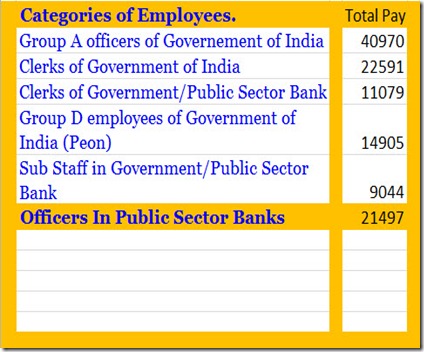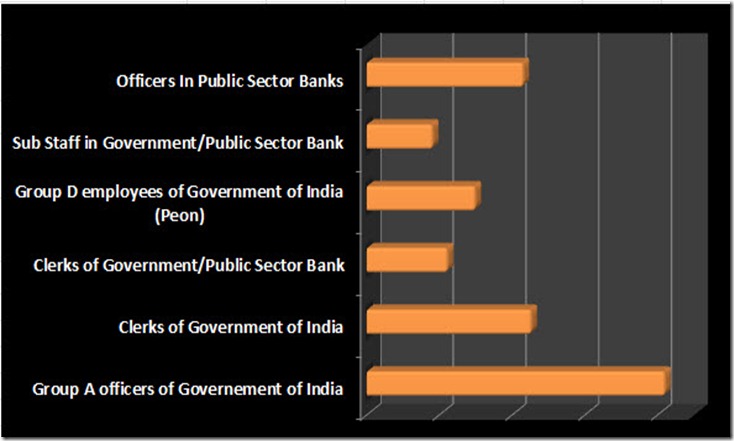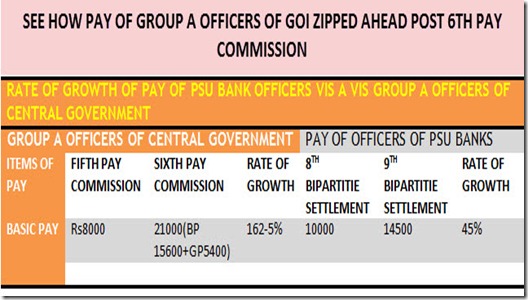10TH BIPARTITE SETTLEMENTS FOR BANKS—VIE FOR PAY PARITY WITH GOI EMPLOYEES, NOTHING LESS.
But, to get the real picture, one need not go further, just a simple comparison with the pay and allowances being given to the employees in central governments and state governments,after the implementation of VIth pay commission recommendations, will reveal the stark disparity.
A closer scrutiny will divulge that, bank employees, particularly, PSU bank employees are actually,among the poorly paid lot.
If the comparison is carried out in line with the concept of ‘external relativity’ ie. comparison of the compensation structure within an organization with the compensation offered by the market/peer group, the quantum of disparity will simply be eye popping.Comparative salary and benefits, as on April, 2010 payables to govt. employees as per VIth Pay Commission and to bank employees as allowed under 9th Bipartite Settlement between Bank Unions and IBA(Please click the above link to view the full data)
 (In this table, past data taken to illustrate the stark differences)
(In this table, past data taken to illustrate the stark differences)It is evident from the given chart that government employees are getting substantially more than salaries being paid to their counterparts in PS Banks. It will also not be out of place to mention that many public sector undertakings are even paying more to their employees than govt. employees.
It is more painful to see that a bank officer is being paid less than a clerk of govt. and a clerk of bank is being paid less than a group D (peon) employee of central govt. What to talk of a sub-staff (4th class)in banks.
The chart below depicts the saga of unequal treatment and all about the stark difference in pay,between GOI employees and PSU Bank employees and depicts the injustice being done to all PS bank employees and allowed to continue unabated for so long.
Do, bank employees, after working for ten to eleven hours daily, for six days in a week and under trying conditions, deserve salaries much below their counterparts in govenment offices? It is a shame and deliberate belittling of the 'dignity of labour' of bank employees.
To top it all,while employees of government departments are allowed one more day of rest everyweek, for unwinding, bank employees are expected to be human robots expected to go on and on without such rest and recuperation and their justified demand for introduction of 5 day weeks are put to back burner when our neighbouring countries like Pakistan, has implemented it last year and now reaping the associated benefits.
 Before 1979,salary of a group A officer of central government was less than that of a bank officer.So, PILLAI committee was constituted to work out a parity between the two and it happened with the implementation of PILLAI committee recommendation on 01-07-1979 and the starting salary of a class A officer of central government was pegged at Rs 700 per month ie. equivalent to that of a bank officer, at that time.
Before 1979,salary of a group A officer of central government was less than that of a bank officer.So, PILLAI committee was constituted to work out a parity between the two and it happened with the implementation of PILLAI committee recommendation on 01-07-1979 and the starting salary of a class A officer of central government was pegged at Rs 700 per month ie. equivalent to that of a bank officer, at that time.Parity sought to be established by the PILLAI committee, way back in July 1979,between salary of group A officers of central government and Bank officers,ignored in subsequent pay revisions and the breach continued to widen and climaxed with implementation of the 6th pay commission recommendations..
The PILLAI Committee rightly observed that the functions and responsibilities of bank officers in the new set-up were comparable to those of Group ‘A’ Officers in the Central Government and suggested pay parity between them
The parity which was established by implementing the Pillai Committee Recommendations was steadily distorted by subsequent Pay Commission revisions.
The disparity climaxed , with the implementation Sixth Pay Commission, the wages of Group ‘A’ Officers zoomed ahead the bank officers’ wages. The concept of ‘External relativity’ consigned to a quiet entombment.
Many State Governments have now followed suit and adopted the Sixth Pay Commission Recommendations.
A number of public sector undertakings have implemented the Pay Commission recommendations as a benchmark for their salary revision and paying even more to placate their workforce.
To top it all, central government employees also have 5 days working weeks.
After seeing the stupendous rate of growth in pay of GOI officers vis a vis, dismal rate of growth of pay of PSU bank officers in corresponding bi partite settlements, as depicted in the above chart, will any body say that, bank employees are earning piles of money on account of hefty salaries ?
INCREASED WORKLOAD FOR BANKS TO COMPLETE THE IGNOMINY CAUSED BY A POOR PAY STRUCTURE:
All the factors of production should be accorded with due and justified compensation, matching their contribution to the national development and it ensures ‘due dignity of labour’.But it is seldom happening at PSU banks:
- The business hours for the customers spanned over four hours a day and working hours for the staff was seven hours with a 30-minute lunch break.It has been extended to six hours a day,albeit, within the daily stipulated working schedule of seven hours.To, take care of back office works and server failures, an officer has to stay late at office and very often, it extends to 11 hours a day, without any matching compensation for late hours worked while in private sector banks, due compensation framework exists for compensating for such late stays.
- Nationalized banks take great pride in being part of the nation building process and employees of PS banks, oblivious of personal discomforts and hardship to their families, take great strides in furthering the aims of bank nationalization ,by manning remote branches throughout the length and breadth of this country and taking cudgels in carrying the message of ‘financial inclusion’ through out the rural hinterland of this country.
- Nationalized bank employees embarked on the task of social banking and after duly accomplishing the same, now successfully graduated into ‘global banking’. But, even then, they are being shackled in a salary structure which bring them less than ‘municipal wages’.
- In spite of undertaking national building activities without any profit earning motives, like, financing cattle in dusty remote villages, operating rural ATMs and loss making rural offices,etc. in 2010-11 PSU banks (27 banks) paid Rs 4,922.66 crore in dividend to government.So, why this reluctance to pay the amount to which the PS bank employees are genuinely entitled to and that too from the income earned by relentless toil of these employees? But the government and negotiators continue to keep mum.
So, on the eve of the 10th Bipartite settlement, everybody, working in nationalized banks, should take a pledge not to take anything short of full parity in salary with government employees and uphold the system of external relativity as done by the PILLAI committee, more than 30 years ago and no other benchmark other than the implemented recommendations of VI th pay commission, should be adopted as benchmarks for demanded pay revision.
Posted by: Himadri Shekhar Bhattacharjee.
BCOM(Hons.),CAIIB,DMFM,DTIRM,NCFM(MFund.), NCFM(Depository), NISM(Depository), CFP(Finalist).
E Mail:roamester@gmail.com
http://www.mitalismusings.blogspot.in/2012/06/10th-bipartite-settlements-for-banksvie.html
http://www.mitalismusings.blogspot.in/2012/06/10th-bipartite-settlements-for-banksvie.html


very well said Sir and the demand is not only justified but in complete accord with today's time. if the employees are not paid equal to their counterparts, this diaspora towards SSC n state services cannot be checked.
ReplyDeleteHimadri Bhai you have made remarkable comparision. The irony of fate of bank employees is that at a time when every thing is changing, bank unions have made no attempt to change. Vested interests have occupied key positions in the unions. Just look at the charter of demands submitted by UFBU, it has been so technically drafted that an average bank employee would not be able to understand. Instead of talking about merger of this and that % of DA and demanding this and that % of increase in salary, it would have been proper to demand parity with Central Govt. Employees or else demanding Rs.1/ less from govt. Employees by giving comparative figures. This applies sqarely on other demands like upgradation of pension etc. When unions depend database prepared by IBA and don't prepare their own database, how you can expect for radical changes. As regards 10th BPS, the database of IBA with regard to actual pension cost in implementation of pension settlement would be a challenge for unions to counter. These unions raise slogan-"maangein hamari poori ho chahe jo mazboori ho" but when they sit on negotiating table they not only forget the slogan but also the charter of demand and get busy in formulating ways and means of increase in salary and other financial benefits in accordace with the figures of available fund provided by IBA. This way they go against their own decision taken at their national executive with regard to finalisation of charter of demands and launching a sustained struggle for achieving demands. Unions are in habit of giving one-two days strike call like 1930 knowing fully that such strike would not create needed pressure, would cause difficulties for common man only and would cause financial loss to their own rank and file. There is an urgent need to replace these traditional weapons like strike with new and more powerful and effective weapons like stay in and proiding unitruppted service without food till demands are fulfilled. Need of the hour is complete turn around of the style of working of the unions to reflect they represent white collor educated and talented employees. Without desired changes, there will be no change in pathetic condition of bank officers and bank workmen
ReplyDeleteKamlesh Chaturvedi sahab, thanks for your excellent comments, highlighting the prevailing scenario. These leaders have become parelllel managements in these banks and have become totally apathetic to causes of employees. See, how these settlements figure and stand vis a vis pay commissions:http://www.mitalismusings.blogspot.in/2012/12/monitoring-10th-bipartitepart-i-our.html
ReplyDeleteI am shocked to see this photo - a women playing game in her system instead of attending customer. Remove this first.
ReplyDeleteno connectivity sir
Deletei'm neither any bank employee nor goverment employee ,but still As a Indian I wanna to say that It realy shameful for banker's present situation . You people worked in a highly pressure enviroment and Still :
ReplyDeleteBank officer's value is lesser than clerk of goverment of india. It realy shameful in All term.
Goverment of India , IBA members please don't make difference like this, and do the needful , as according to current inflation .
heavy work load minimum pay ???
ReplyDeletelooks H.R.A. only 7% to 10 % while rate of residential increasing rapidly across the country. GOI emp get 10% to 30% why??
The facts are very well presented. The disparity must be eradicated. But, please, also think of the Bank pensioners.Bipartite should include a chapter to bring parity between the Bank pensioners and Govt pensioners. Updation of pension in case of new Bipartite settlement must be carried out as done in case of salary revision of Govt employees.
ReplyDeleteNo of meettings between IBA and UFBU must be restricted to 3 and should be carried out within 6 months span.or else all PSU shall remian closed untill our demands are met.banks should not b soft anymore.we must go for the kill.
ReplyDeleteI agree with Mr. Himadri.
ReplyDelete